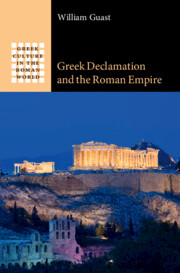23 results
Chapter 2 - Declamation, Life, and the Imagination
-
- Book:
- Greek Declamation and the Roman Empire
- Published online:
- 22 June 2023
- Print publication:
- 06 July 2023, pp 53-70
-
- Chapter
- Export citation
Appendices
-
- Book:
- Greek Declamation and the Roman Empire
- Published online:
- 22 June 2023
- Print publication:
- 06 July 2023, pp 189-193
-
- Chapter
- Export citation
Preface
-
- Book:
- Greek Declamation and the Roman Empire
- Published online:
- 22 June 2023
- Print publication:
- 06 July 2023, pp ix-x
-
- Chapter
- Export citation
Chapter 4 - Identity Parade
-
- Book:
- Greek Declamation and the Roman Empire
- Published online:
- 22 June 2023
- Print publication:
- 06 July 2023, pp 92-118
-
- Chapter
- Export citation
Appendix 2 - Other Sources for Declamation
-
- Book:
- Greek Declamation and the Roman Empire
- Published online:
- 22 June 2023
- Print publication:
- 06 July 2023, pp 191-193
-
- Chapter
- Export citation
Chapter 3 - Text and Performance Context
-
- Book:
- Greek Declamation and the Roman Empire
- Published online:
- 22 June 2023
- Print publication:
- 06 July 2023, pp 71-91
-
- Chapter
- Export citation
Appendix 1 - The Authenticity of Herodes Peri Politeias
-
- Book:
- Greek Declamation and the Roman Empire
- Published online:
- 22 June 2023
- Print publication:
- 06 July 2023, pp 189-190
-
- Chapter
- Export citation
Index
-
- Book:
- Greek Declamation and the Roman Empire
- Published online:
- 22 June 2023
- Print publication:
- 06 July 2023, pp 213-216
-
- Chapter
- Export citation
Chapter 1 - Exempla and Exemplarity
-
- Book:
- Greek Declamation and the Roman Empire
- Published online:
- 22 June 2023
- Print publication:
- 06 July 2023, pp 18-52
-
- Chapter
- Export citation
Chapter 5 - Macedon
-
- Book:
- Greek Declamation and the Roman Empire
- Published online:
- 22 June 2023
- Print publication:
- 06 July 2023, pp 119-150
-
- Chapter
- Export citation
Introduction
-
- Book:
- Greek Declamation and the Roman Empire
- Published online:
- 22 June 2023
- Print publication:
- 06 July 2023, pp 1-17
-
- Chapter
- Export citation
Conclusion
-
- Book:
- Greek Declamation and the Roman Empire
- Published online:
- 22 June 2023
- Print publication:
- 06 July 2023, pp 180-188
-
- Chapter
- Export citation
Abbreviations
-
- Book:
- Greek Declamation and the Roman Empire
- Published online:
- 22 June 2023
- Print publication:
- 06 July 2023, pp xi-xiv
-
- Chapter
- Export citation
Contents
-
- Book:
- Greek Declamation and the Roman Empire
- Published online:
- 22 June 2023
- Print publication:
- 06 July 2023, pp vii-viii
-
- Chapter
- Export citation
Copyright page
-
- Book:
- Greek Declamation and the Roman Empire
- Published online:
- 22 June 2023
- Print publication:
- 06 July 2023, pp iv-iv
-
- Chapter
- Export citation
Chapter 6 - Strife and Concord
-
- Book:
- Greek Declamation and the Roman Empire
- Published online:
- 22 June 2023
- Print publication:
- 06 July 2023, pp 151-179
-
- Chapter
- Export citation
References
-
- Book:
- Greek Declamation and the Roman Empire
- Published online:
- 22 June 2023
- Print publication:
- 06 July 2023, pp 194-212
-
- Chapter
- Export citation
Dedication
-
- Book:
- Greek Declamation and the Roman Empire
- Published online:
- 22 June 2023
- Print publication:
- 06 July 2023, pp v-vi
-
- Chapter
- Export citation

Greek Declamation and the Roman Empire
-
- Published online:
- 22 June 2023
- Print publication:
- 06 July 2023
Chapter 3 - Greek Declamation and the Art of Resistance
- from Part II - Genres of Literary Resistance
-
-
- Book:
- Articulating Resistance under the Roman Empire
- Published online:
- 23 December 2022
- Print publication:
- 05 January 2023, pp 71-88
-
- Chapter
- Export citation



